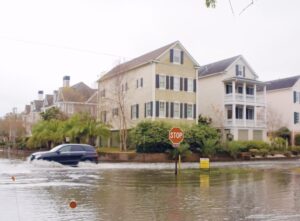A presentation about Sarasota Bay’s water quality veers into the big picture: A warming planet.
By Johannes Werner
Original Air Date: October 23, 2024
Host: The Sarasota City Commissioners were going to get a presentation about water quality in the Bay after recent storms. They did. But Dr. Dave Tomasko went beyond that and made the commissioners look at the big picture: Climate change.
Johannes Werner: Hurricane Debby produced a 17-million gallon sewage spill at the City of Sarasota’s wastewater treatment plant. On Monday, utilities staff explained to City of Sarasota Commissioners how it happened. They highlighted the utility crews’ hard work to prevent worse, and generally how the city’s water and sewage infrastructure held up during the recent series of storms and flood events. They were followed by a scientist who was supposed to give the commission a presentation about the health of Sarasota Bay, which he did. And that’s good news, because the water quality has improved greatly since Sarasota County put $250 million into an upgrade of its biggest water treatment plant. But Dr. Dave Tomasko went beyond the narrow issue of water quality.
Here is how the head of the Sarasota Bay Estuary Program got the attention of elected officials and city staffers.

Dave Tomasko
Dave Tomasko: You can’t solve a problem if you don’t face it. It’s like having an alcoholic in your family; you can’t fix it unless you face it. And here’s how I describe the problem we should be facing head on: The problem that we have is, it’s getting warmer. Our planet is changing. It just is. 30, 40 years ago, when I first started my career, we talked about climate change as a potential, like maybe this is something we should be concerned with. It’s here. You’re living it. We have hurricane landfall records in Florida that go back to the 1550s. Before Jamestown, before Plymouth Rock, but we’ve got good data for the last 100 years or so. And in the North Atlantic Basin over the last 100 years, we’ve had about 40 Category 5 hurricanes. 40% of those have happened in the last 20 years. So 40% of our Category 5 hurricanes have occurred in the last 20% of the last century. Temperatures are changing, our air is getting warmer, our water is getting warmer, and that is creating conditions that are giving us things like this.
 This is our sea level rise data. We’re not using a fancy model, we’re just using real data. The period of record that we have is about an inch a decade. It’s not that scary. We think an inch a decade is the rate of sea level rise we’ve had for about the last 5,000 years. The last 20 years? We’ve had six inches. So sea level has come up six inches in 20 years. Not six feet, but six inches. But what that means is in the year 2050, the average sea level, what we call the average tide level, mean sea level, will be what today’s high tide is. And high tides will be nine inches on top of that. So the concern that we’re going to have moving forward is that all the investments we’re making on our wastewater and our stormwater are going to be complicated by the fact that it’s just getting warmer.
This is our sea level rise data. We’re not using a fancy model, we’re just using real data. The period of record that we have is about an inch a decade. It’s not that scary. We think an inch a decade is the rate of sea level rise we’ve had for about the last 5,000 years. The last 20 years? We’ve had six inches. So sea level has come up six inches in 20 years. Not six feet, but six inches. But what that means is in the year 2050, the average sea level, what we call the average tide level, mean sea level, will be what today’s high tide is. And high tides will be nine inches on top of that. So the concern that we’re going to have moving forward is that all the investments we’re making on our wastewater and our stormwater are going to be complicated by the fact that it’s just getting warmer.
If you took, if you took your CO2 emissions, you went down to zero, we’re already stuck. We’re already baked into a certain amount of what’s going to happen. It’s sort of like … imagine a pot of water on your stove, right? And you’ve been heating it and heating it, and then you turn the flame off. It doesn’t cool down right away. And right now, most of the sea level rise that we’re seeing is from thermal expansion. The scary thing is not Antarctica. The scary thing is Greenland. Greenland, if it all melts, and no one expects it’s going to all melt, would be 20 feet of sea level rise. But what if 5% of it melts? That would be a foot. So if 5% of Greenland’s ice cap — which is ice that’s not in the water, it’s on the land — if 5 percent of Greenland melts, you got one more foot. And we’re already expecting nine more inches from thermal expansion. Suddenly, we’ve realized a two and a half foot storm surge floods a lot of streets.
JW: He laid out why the city must prepare for blue sky flooding.
DT: Riverview Boulevard in Bradenton is a great example of where it’s not raining, it’s not a storm surge, it’s just when on a high tide, the water from the Manatee River comes up into the streets. Same thing happens in Longboat Key Village. Same thing is going to happen more frequently in your lower lying areas. So I think in your lower lying areas, you’re going to have to do things like one way valves on storm drains. That’s not going to help if it rains. So when it rains on a high tide, you’re going to find those are your most susceptible neighborhoods, the low lying neighborhoods. It’s not going to take a storm to flood them. It’s going to be when it rains on a high tide. And that’s happening in Gulfport; It’s happening in Tarpon Springs; It’s happening in Longboat Key Village. It’s going to happen in more places over the next couple of decades.
JW: To be sure, Tomasko has praised the City of Sarasota’s water and sewage system as the second-best in Florida – after Disney. Utility crews proved their mettle in the recent storms. And the city built not only one of the most advanced water treatment plants, but it is in the middle of a $300 million, 11-year program of renewing its aging water and sewage lines. Even so, he urged city commissioners to plan now for the challenges ahead that come with rising sea levels.
DT: We’re not creating hurricanes. We’re creating more powerful hurricanes, and that’s gonna be a stress on your infrastructure for stormwater and wastewater. It’s gonna be a stress on the bay, and it’s something that we need to work through over the next 30 years because the weather the next 30 years is not gonna be the weather you’ve had the last 30 years. It’s gonna be a warmer planet, and it’s gonna be more frequently encountering violent storms. Doesn’t mean you’re gonna have one next year. You might not have another storm like this for 10 years. But we’re loading more bullets into the revolver playing Russian Roulette. One of the things that’s going to happen is the private market and insurance is going to have to figure out whether or not it makes sense to continue to build the way we have in the past on barrier islands. And I think barrier islands are going to be where climate change hits us. That’s ground zero.
JW: The utility staffers explained that the spill during Debby was caused by a clogged pipe between storage tanks at the water treatment plant. Commissioner questions focused on the clogged pipe and how to prevent it from happening again.
The only one who questioned why so much water was flowing into the treatment plant in the first place was Tomasko. He brought up the possible need of lining leaky old pipes – many of them privately owned – that load up with stormwater during hurricanes and overwhelm the water treatment plant.
DT: I think part of it is lining your wastewater collection system is going to be really, really helpful. That’s not necessarily going to solve all your problems, but wastewater is more impactful than stormwater. It just is.
City Commissioner: What do you mean by lining?
DT: So, for example, your collection system pipes — and I have no idea, Vern is the expert on this, if that is your big issue here — but for example, the worst wastewater treatment plant problems we have right now is Bradenton and they need to line about 70 miles of their wastewater collection system. When the water table gets high, the water seeps into the pipes. That’s what they get their overflows from. Water comes in through the manholes and it comes in through the groundwater. And if you can line those pipes, some of them are 50, 70 years old. They’re like clay, the terracotta, like you put a planter in and I think if we can do a lot more of that then we’re gonna actually reduce some of the infiltration inflows So you won’t have the huge volume of water that comes in; it overwhelms your wastewater treatment plant. That’s one thing that can be done.
JW: None of the commissioners and staffers picked up the ball.
Johannes Werner, reporting for WSLR News.
WSLR News aims to keep the local community informed with our 1/2 hour local news show, quarterly newspaper and social media feeds. The local news broadcast airs on Wednesdays and Fridays at 6pm.